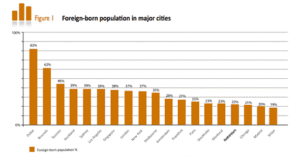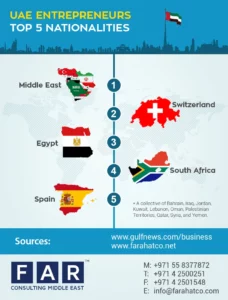Demographic Overview of Dubai
Dubai is one of the seven emirates of the United Arab Emirates on the southeast coast of the Persian Gulf. According to government data, as of April 2022, about 3.5 million people are living in the city. The population of Dubai is diverse, with people from more than 200 nationalities living in the city.
Here are some critical demographic statistics about Dubai:
- The population of Dubai is estimated to be 3.5 million as of April 2022, with 69% being male.
- About 85% of the population are expatriates, with just 15% being native residents.
- The largest expat group in Dubai is from India, accounting for 51% of the total expat population, followed by Pakistan (17%), Bangladesh (9%), and the Philippines (3%).
- The age group with the highest concentration of people in Dubai is 25-44 years old, with about 58.50% of the population in this age group.
- The median age in Dubai is around 34 years old.
- The birth rate in Dubai is 9.1 births per 1,000 people, while the death rate is 1.2 deaths per 1,000 people.
- The population growth rate in Dubai is around 1.1% per year.
- The net migration rate in Dubai is positive, with more people moving into the city than leaving.
Dubai’s population is constantly evolving due to the high number of migrants and expats who come to the city to work and live. As a result, the city has a unique and diverse population, with people from all over the world living together and contributing to the city’s growth and development.
Nationality Breakdown
Most people in Dubai are expats, creating a melting pot of diverse ethnicities. Here is a breakdown of the top nationalities in Dubai:
Asian Communities
Most expatriates in Dubai are from Asian communities, with India, Pakistan, Bangladesh, and the Philippines being the top nationalities. Indians comprise the largest expat community in Dubai, accounting for 27% of the total population. Pakistanis and Bangladeshis follow closely behind, making up 12% and 7% of the population, respectively. The Filipino community is also significant, with 6% of the population being Filipino.
Middle Eastern and African Nationalities
Middle Eastern and African nationalities are also well-represented in Dubai, with Egyptians being the largest group in these regions. Egyptians make up 6% of the population in Dubai. Emiratis, the native population of Dubai, make up only 15% of the total population. Other nationalities from the Middle East and Africa include Iranians, who comprise 5% of the population, and Africans, who make up 3% of the population.
Western Expatriates
Moreover, Western expatriates comprise a smaller population, with 8% categorized as “Western.” The Western expat community is diverse, with Americans, British, and Australians being the top nationalities. Additionally, other Western nationalities include Canadians, Germans, and French.
In conclusion, Dubai is a diverse city with a large expat population. The Asian communities are the largest group, followed by Middle Eastern and African nationalities and Western expatriates.
Cultural and Religious Landscape
Dubai is an amalgam of diverse cultures and religions, with over 200 nationalities in the city. This diversity appears in the cultural and religious landscape of Dubai.
Languages Spoken
The official language of Dubai is Arabic, but English is widely spoken and understood. Most residents speak Hindi, Urdu, Malayalam, and Filipino in Dubai.
Religious Composition
The majority of people in Dubai are Muslims, and Islam is the official religion of the city. However, Dubai is also home to a significant number of Christians, Hindus, Buddhists, and Sikhs.
The religious composition of Dubai is as follows:
- Muslims: Most of the population is Muslim, with Sunni Islam being the dominant sect. Muslims in Dubai observe regular prayer times as part of their significant Islamic lifestyle.
- Christians: Dubai is home to many Christians, as Catholicism is the largest Christian denomination in the city. Other Christian denominations represented in Dubai include Anglicans, Orthodox, and Protestants.
- Hindus: Hinduism is the third-largest religion in Dubai, with many Hindus living and working in the city. Hindu temples exist throughout Dubai, with the Shiva and Krishna temples being the most prominent.
- Buddhists: Buddhism is a minority religion in Dubai, but many Buddhists live and work in the city. Dubai is home to several Buddhist temples, including the Dubai Buddhist Centre.
- Sikhs: Sikhism is a minority religion in Dubai, but there is still a significant Sikh community in the city. The Sikh Gurudwara in Dubai is a prominent place of worship for Sikhs.
In conclusion, Dubai’s diverse cultural and religious landscape reflects the many nationalities and religions that call the city home.
Economic Contributions by Nationalities
Dubai is a business, commercial, professional, and real estate hub. The city has a well-developed infrastructure and a flourishing tourism industry. The UAE, of which Dubai is a part, is home to a sizeable expatriate population, with foreign workers creating a significant portion of the workforce.
Here are some of the economic contributions made by different nationalities in Dubai:
- Indians: the largest expatriate community in Dubai, with a population of over 3 million. They are involved in various sectors, including retail, construction, and hospitality. They have also significantly contributed to the real estate sector, with many Indian investors investing in Dubai’s property market.
- Pakistanis: Pakistanis are the second-largest expatriate community in Dubai, with a population of over 1.2 million. They are involved in various sectors, including construction, hospitality, and retail. They have also made significant contributions to the real estate sector, with many Pakistani investors investing in Dubai’s property market.
- South Asians: South Asians, including Indians, Pakistanis, and Bangladeshis, comprise a significant portion of Dubai’s expatriate population. They are involved in various sectors, including construction, hospitality, and retail. They have also significantly contributed to the real estate sector, with many South Asian investors investing in Dubai’s property market.
- Emiratis: Emiratis are the native population of the UAE and make up a small percentage of Dubai’s population. They are involved in various sectors, including government, finance, and real estate. They have also made significant contributions to the tourism industry, with many Emiratis owning hotels and resorts in Dubai.
- Other nationalities: Other nationalities, including Europeans, Americans, and Africans, are also involved in various sectors in Dubai, including finance, healthcare, and education. They have also significantly contributed to the real estate sector, with many foreign investors investing in Dubai’s property market.
In summary, Dubai’s economy is diverse and thriving, with contributions from various nationalities. The city’s well-developed infrastructure, flourishing tourism industry, and business-friendly environment make it an attractive destination for investors and entrepreneurs worldwide.
Population Dynamics and Trends
Dubai’s population growth has been remarkable, from a modest 183,000 residents in 1975 to over 3.6 million in 2023. Dubai’s population will almost triple during the next 20 years, according to experts who predict a fresh wave of post-pandemic immigration. Dubai thrives as a global hub with a growing population and diverse nationalities.
Here are some fundamental population dynamics and trends in Dubai:
- The UAE’s population in 2024 stands at 10.24 million, with Dubai being the most populous city in the country.
- Out of this, the number of UAE citizens is around 1 million, with expatriates still outnumbering the Emiratis.
- The male population is 6,888,345, representing 69 percent, and the female population is 3,102,738, representing 31 percent.
- Dubai’s population will surge to nearly 6 million in 20 years amid urban development and immigration.
- The life expectancy in Dubai is around 77 years for men and 81 years for women.
- The age group of 25-54 years represents the largest age group in Dubai, with the median age being 34.
- Dubai’s population is diverse, with Indians being the largest expatriate population, followed by Pakistanis, Bangladeshis, and Filipinos.
Dubai’s population dynamics and trends will undergo further changes in the coming years, with the city continuing to attract people worldwide due to its economic opportunities and cultural diversity.
Government Policies and Expatriate Life
Dubai’s government has implemented policies that aim to attract and retain expatriates from all over the world. These policies aim to make Dubai a desirable location for work and living. Here are some of the policies that have been implemented:
Residence and Employment Regulations
- The UAE government has introduced a new long-term visa system that allows expatriates to stay in the country for up to 10 years. This system aims to attract investors, entrepreneurs, and highly skilled professionals to the government.
- Expatriates can sponsor their family members to live with them in Dubai. The government has made it easier for expatriate families to obtain residency visas, which makes it possible for them to live and work in the country.
- The Dubai government has implemented a new labor law that protects workers’ rights. This law includes minimum wage, working hours, and annual leave provisions. The government has also established a labor court to resolve disputes between employers and employees.
Social Welfare and Safety
- Dubai has a comprehensive healthcare system that provides high-quality medical care to residents. Additionally, the government has implemented a mandatory health insurance scheme that covers all residents, including expatriates. Moreover, the Dubai Police Force is responsible for maintaining law and order in the city. The police force is well-equipped and highly trained, ensuring the city is safe for residents and visitors.

 Furthermore, the Dubai government has implemented several social welfare programs supporting low-income families and individuals. These programs include housing assistance, food subsidies, and financial aid.
Furthermore, the Dubai government has implemented several social welfare programs supporting low-income families and individuals. These programs include housing assistance, food subsidies, and financial aid.
Overall, Dubai’s government policies have made it a desirable location for expatriates worldwide. The government’s focus on social welfare and safety and its efforts to attract highly skilled professionals have made Dubai a great place to live and work.
Frequently Asked Questions
What are the predominant expatriate communities in Dubai?
Dubai is home to diverse expatriate communities, the largest of which are Indian, Pakistani, Bangladeshi, Filipino, and Egyptian. These communities are significant in the city and contribute to its cultural diversity.
How does the population of Dubai break down by nationality?
According to recent statistics, Dubai’s population comprises approximately 89% expatriates and 11% Emirati citizens. The majority of the expatriate population comes from South Asia, with Indians and Pakistanis making up the most prominent groups.
What percentage of Dubai’s population are Emirati citizens?
As mentioned, Emirati citizens comprise around 11% of Dubai’s population, partly due to the city’s attractiveness to expats and immigrants and the high quality of life it offers.
Which foreign nationalities have the most significant presence in Dubai?
Indians and Pakistanis have the most significant presence among foreign nationalities in Dubai, followed by Bangladeshis, Filipinos, and Egyptians. Other important communities include Iranians, Britons, and Americans.
How has the demographic composition of Dubai changed in recent years?
Dubai’s demographic composition has changed significantly recently, with the population becoming increasingly diverse. The city has seen a rise in the number of Western expatriates and an increase in the number of Chinese and Russian visitors.
What is the number of Filipinos currently residing in the UAE?
The Philippine Embassy in Abu Dhabi says over 700,000 Filipinos reside in the UAE. They make up a significant portion of the expatriate population in Dubai and contribute to the city’s vibrant cultural scene.












